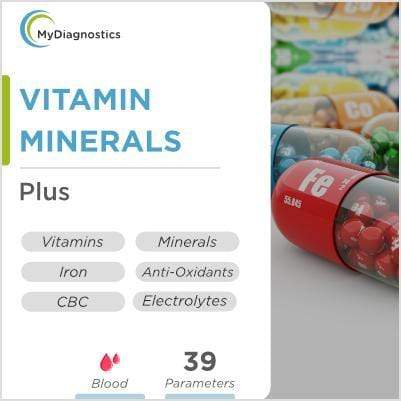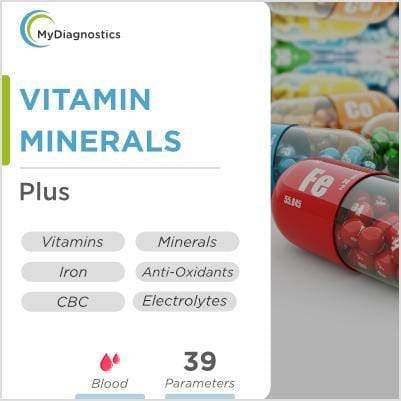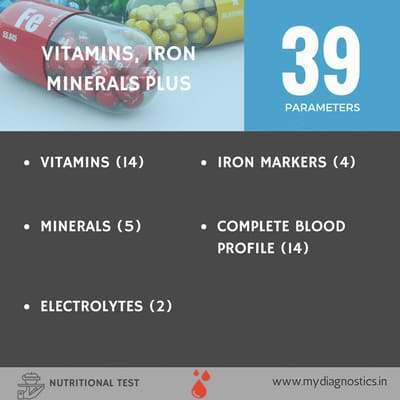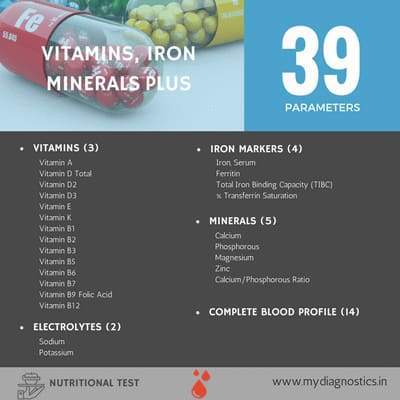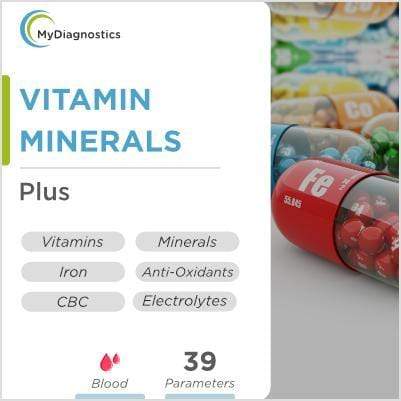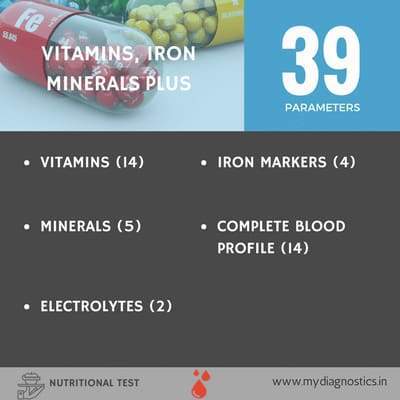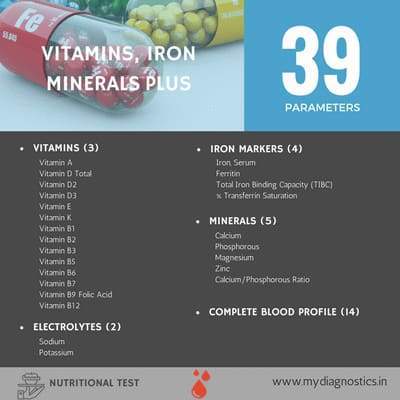Nutritional Deficiency Plus - Vitamin, Minerals & Iron Profile Blood Test at Home
Test Parameters
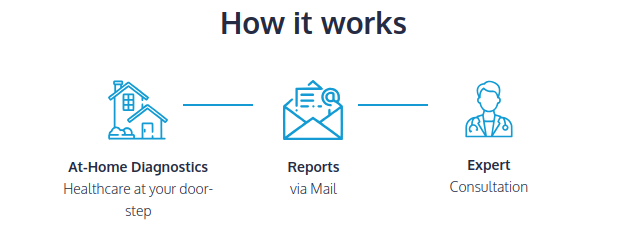
About the Vitamins, Iron and Mineral Deficiency Plus Test
What is nutrition as it relates to health?
The comprehensive nutritional deficiency test is a complete nutritional analysis of your core levels. The blood test checks for deficiencies across minerals, vitamins, iron, electrolytes, and core blood health markers. This provides a robust medical perspective of overall deficiency levels and mineral levels, particularly regarding vitamin and mineral deficiencies, through the vitamin deficiency test, including tests for oily fish, and testing of 39 parameters..
You can consult with a specialist about targeting specific deficiencies, which may be creating imbalances within your body. E.g., a vitamin D deficiency along with an iron deficiency can lead to brittle bones, painful joints, swelling, weakness, etc. By knowing if you are deficient in both D3, vitamin b12, vitamin c, and Iron, which can contribute to weak bones and low vitamin d levels, you can target both deficiencies through diet and supplementation.
You can get our nutritional deficiency tests across major cities in India. Our testing coverage includes Bangalore, Hyderabad, Chennai, Mumbai, Pune, Ahmedabad, Delhi, Gurgaon, Noida, Ghaziabad, Faridabad, Jaipur, Lucknow, Kolkata, and Chandigarh. You can easily order an at-home test in these cities and get your report delivered directly to your email address.

Health issues that can arise due to nutritional deficiencies
Maintaining a nutritional balance is the most important element of healthy living, as it can impact a wide range of bodily functions for people. A lack of a healthy diet can cause the following health issues, including vitamin and mineral deficiencies -
Mineral Deficiency
Minerals are specific types of nutrients that the body requires to function properly for optimal health . They are vital to ensuring that your bones, heart, and brain function properly, and that you are able to repair damage effectively.
Your body may not be able to acquire or absorb nutrients, including the right minerals in the right quantities which can lead to critical issues. Since there are 21 essential minerals required by the body, they need to be consumed via a nutrition-rich diet.
The major minerals are calcium, phosphorous, potassium, sodium, and magnesium. They can't be produced within the body, and a diet rich in minerals is key to ensuring balance.
Vitamins Deficiency
Vitamins in the body have multiple functions, which is why they are extensively studied and tested, including vitamin e, to learn more about their role in the body. They are also vital to maintaining immunity, and ensuring that we maintain healthy bones, skin, and mucous membranes.
While vitamin B is responsible for metabolic function and maintaining the CNS, Vitamin C is critical for wound healing and fighting off infections. A diet rich in vitamin balance is what our body needs to ensure we get enough vitamin .
In total, our body needs 13 essential vitamins which are vitamin A, C, D, E, K and the B vitamins: thiamine (B1), riboflavin (B2), niacin (B3), pantothenic acid (B5), pyridoxine (B6), biotin (B7), folate (B9) and cobalamin (B12). Fat-soluble vitamins A, D, E, and K are stored in the body’s fatty tissues. Vitamin B12 is water-soluble and is stored in the liver.
Proteins Deficiency
Proteins are vital to health and development, repair of muscle tissue, as well as playing a vital role in hormone production and preventing symptoms like dry skin . They are also referred to as the building blocks of life and are made up of amino acids. There are a total of 20 amino acids, 9 of which are essential and 11 are non-essential amino acids.
A balance of these 20 amino acids are required to stay healthy and ensure optimal functioning of various systems. A deficiency is reported if you aren't able to meet the daily requirements of protein from food, and you start to experience symptoms associated with protein deficiency such as muscle weakness, low energy, improper healing, etc.
Lipids Deficiency
Lipids are fat-like chemicals in the body that form a critical part of the membrane found between cells and in the myelin sheath that protects nerve cells through a coating. This ensures the prevention of neuro-degenerative diseases that are caused due to coating erosion. Lipids include oils, fatty acids, waxes, steroids, and other critical compounds.
Essential fatty acids, particularly from oily fish, are important from a nutritional standpoint, as the right amount of healthy fats are key to effective brain, skin, and heart functioning. You can be at a higher risk of cancer, atherosclerosis, coronary heart disease, cognitive decline, and chronic inflammation. if you don't have the right fatty acids, and consider taking vitamin d supplements .
Common Symptoms of Nutrient Deficiency
A lack of good nutrition and healthy diets may lead to the following signs and symptoms, resulting in various health problems, including severe deficiencies, and dietary supplements can help address these issues, which can be identified through a blood sample
- Dullness, or pale skin, hair loss
- fatigue, weakness, feeling faint or fainting
- trouble breathing
- unusual food cravings
- periods of lightheadedness
- constipation
- sleepiness
- heart palpitations
- depression
- tingling and numbness of the joints
- menstrual issues, such as missed periods or very heavy cycles
- poor concentration
The relationship between Nutrient Deficiency & Immune Function
A deficiency of nutrients can alter the body’s immune response, making it crucial to identify deficiencies through proper testing . Various studies have found that deficiencies in zinc, selenium, iron, copper, folic acid, and vitamins A, B6, C, D, and E can alter immune responses, and in some cases, too much vitamin d can also lead to toxicity . These nutrients help the immune system in several ways: working as an antioxidant to protect healthy cells, particularly when taken alongside certain medications supporting growth and activity of immune cells, and producing antibodies. Epidemiological studies find that those who are poorly nourished are at greater risk of bacterial, viral, and other infections due to existing medical conditions .

